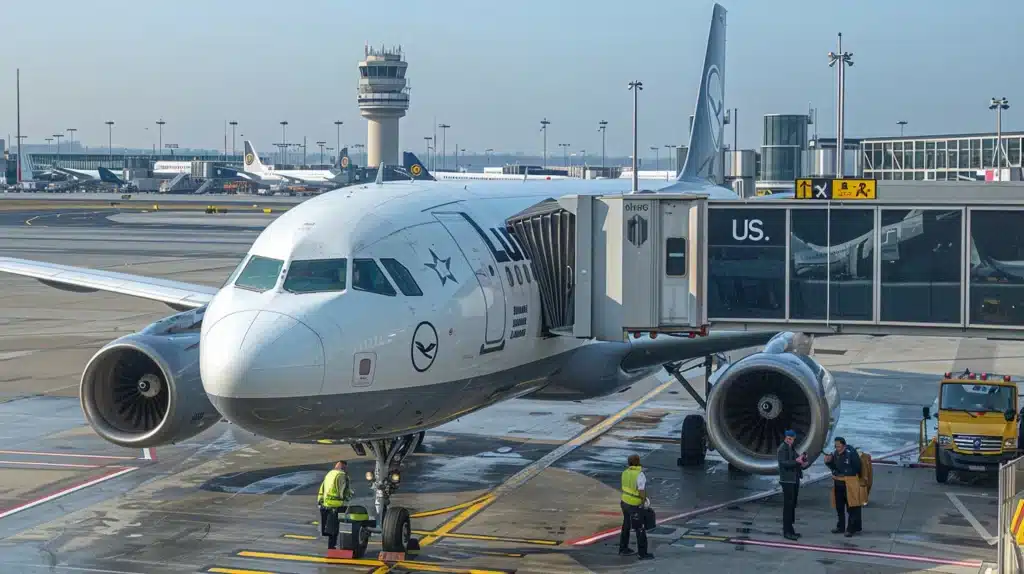Lufthansa’s Lesson: A Step Towards Tackling Discrimination in the Skies
In a landmark decision that has reverberated across the airline industry, Lufthansa has agreed to pay a $4 million penalty for an incident that involved discriminating against Jewish passengers. This event, which unfolded in May 2022, marks a significant moment in the ongoing battle against discrimination and highlights the challenges that still face the Jewish community, even in supposedly inclusive spaces like international travel.
The Incident That Sparked Outrage
It all began on a flight from New York to Frankfurt, where 128 Jewish passengers, many adorned in traditional Orthodox attire, were set to connect to Budapest. However, what should have been a routine transfer turned into a distressing ordeal when these passengers were denied boarding. The reason cited? Alleged misbehavior by some individuals among them—an accusation that later investigations would find to be grossly generalized and discriminatory.
Lufthansa’s Response and Repercussions
Though Lufthansa initially denied any wrongdoing, claiming that up to 60 passengers had disregarded crew instructions, the U.S. Transportation Department (DOT) intervened, leading to a thorough investigation. The outcome was clear: Lufthansa’s actions were discriminatory, prompting them to issue multiple public apologies and agree to a hefty $4 million penalty—the largest ever issued by the DOT for civil rights violations.
This penalty is not just a financial burden but also a catalyst for change. Half of it is a direct fine, while the other $2 million offsets compensation already paid to affected passengers. But beyond the monetary implications, this incident has pushed Lufthansa to reevaluate and revamp its approach towards discrimination.
Steps Towards Change
In the wake of this event, Lufthansa has not only cooperated with DOT but has also taken proactive steps to ensure such an incident never recurs:
- Partnership with American Jewish Committee: This collaboration aims to develop training programs focused on combating antisemitism and discrimination within the airline industry.
- Employee Training Programs: These are designed to educate and sensitize Lufthansa staff about cultural diversity and the importance of treating all passengers with respect, regardless of their background or religious beliefs.
- Public Apologies: Lufthansa has made several public apologies, acknowledging their mistakes and underscoring their commitment to learning from this experience.
The Broader Impact
This incident is not just about one group of passengers on one airline; it reflects broader societal issues of racial and religious discrimination that permeate even the most global of industries. Transportation Secretary Pete Buttigieg emphasized that this action sends a “clear message” about the DOT’s commitment to protecting civil rights.
The repercussions extend beyond immediate financial penalties or operational changes within Lufthansa. They serve as a wake-up call to all airlines about the importance of equitable treatment of all passengers and the legal and ethical implications of failing to uphold these standards.
Community Reactions
The response from the Jewish community and other advocacy groups has been one of cautious optimism. While appreciative of the swift action by DOT and the measures taken by Lufthansa, many believe this should be a stepping stone towards more profound changes across the airline industry globally.
“This incident was deeply unsettling, but it has sparked important conversations and actions towards ensuring such discrimination does not happen again. It’s a reminder of the work still needed in fighting antisemitism everywhere,” said a spokesperson from an influential Jewish organization.
Looking Forward
The journey towards eliminating discrimination in air travel continues. Each step taken—be it a penalty, a new training program, or public acknowledgment—serves as part of a larger effort to create an inclusive environment where all passengers can feel safe and respected. For Lufthansa and other airlines, this incident is not just about rectifying a mistake but about leading by example in the fight against discrimination.
Conclusion
The Lufthansa incident serves as a stark reminder of the challenges that remain in combating antisemitism and discrimination within seemingly progressive spaces like international travel. However, it also highlights the potential for positive change through accountability and proactive measures. As we move forward, let this be a lesson in both the fragility of progress and the enduring strength of commitment to civil rights.



